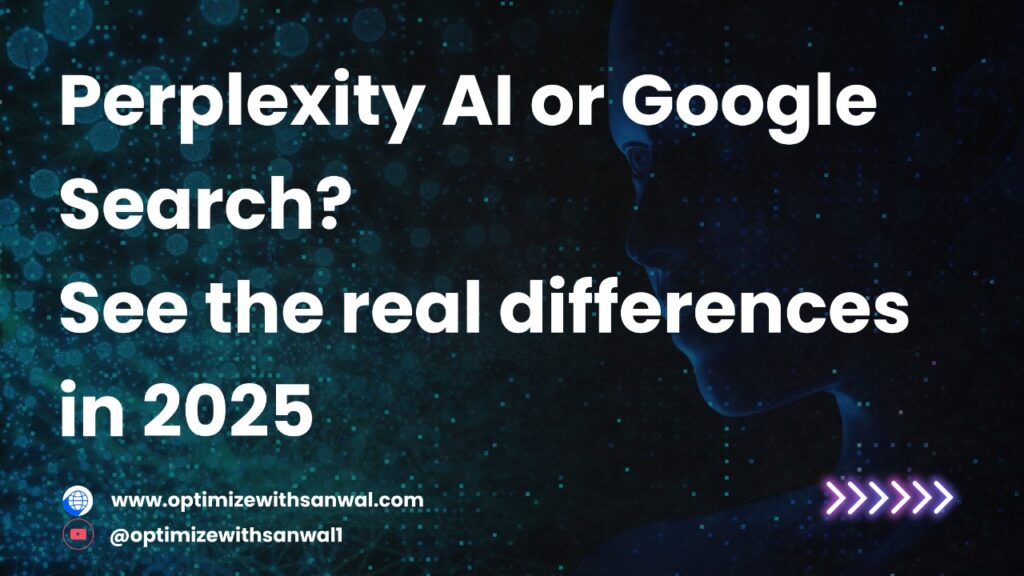Perplexity AI vs Google Search: What Really Sets Them Apart
I’ve been experimenting with search engines and AI tools for years, and one question I often hear is: Can Perplexity AI replace Google Search? Or, put another way, how does Perplexity AI compare to the Google experience we’ve been using daily for decades?
That’s exactly what I’ll break down here — in simple language, without hype. By the end, you’ll see where Perplexity shines, where Google Search remains unbeatable, and why both matter in 2025. This guide is brought to you by optimizewithsanwal.
What is Perplexity AI?
Perplexity AI is often called the “AI search engine,” but it works differently from Google. Instead of giving you a long page of blue links, Perplexity pulls answers directly from trusted sources and presents them in a conversational way.
Key highlights of Perplexity AI:
- Gives direct, summarized answers.
- Shows sources at the bottom of each response.
- Lets you ask follow-up questions in a chat-style format.
- Focuses on quick, reliable knowledge instead of SEO rankings.
For someone like me who spends hours researching, this saves time when I need clarity without scrolling through multiple sites.
What is Google Search (and SGE)?
Google Search is still the world’s largest gateway to information. Unlike Perplexity, it’s built around Search Engine Results Pages (SERPs), where ranking and visibility matter.
In 2025, Google has also rolled out its Search Generative Experience (SGE). This adds AI-powered summaries above search results, a lot like Perplexity does, but still ties heavily to ads, SEO, and Google’s ecosystem.
So, when comparing Google Search vs Perplexity AI, you’re essentially comparing:
- A traditional search + AI hybrid (Google).
- A pure conversational AI-driven engine (Perplexity).
Perplexity AI vs Google SERP Tracking
One of the biggest differences is in SERP tracking.
- Google Search thrives on rankings: websites compete for top spots, SEO strategics like me optimize content for visibility, and tools track movements on Google’s SERPs.
- Perplexity AI doesn’t care about rankings. It selects relevant sources and cites them, often pulling from sites that may not even be in the top 10 on Google.
This means Google is still king for SEO and SERP tracking, but Perplexity is better for direct, unbiased answers.
Perplexity vs Google — Direct Comparison
Here’s a side-by-side view of Perplexity AI vs Google Search:
| Feature | Perplexity AI | Google Search |
| Style of Results | Conversational answers with sources | SERPs with links, ads, snippets |
| AI Integration | Fully AI-driven | SGE adds AI summaries on top |
| Transparency | Shows sources clearly | Sometimes hides behind snippets |
| Ads | No ads (for now) | Heavy ad presence |
| Follow-up Questions | Chat-style conversations | New search each time |
| SEO Impact | Doesn’t rank sites | Ranking is core to results |
This table sums it up: Google = results-driven, Perplexity = answer-driven.
Perplexity AI vs Google’s Search Generative Experience
Some people ask me: How does Perplexity AI compare to Google’s SGE?
The truth is, they look similar at first. Both give AI-written summaries. But the difference is in execution:
- Perplexity AI cites multiple sources right away.
- Google SGE sometimes paraphrases without clear links.
- Perplexity feels like a research assistant.
- SGE feels like a quick preview before clicking into sites.
So, SGE is Google’s way of catching up, but Perplexity was built for this style from the start.
Perplexity AI vs Traditional SEO Tools
Another question I hear: How does Perplexity compare to SEO tools like Ahrefs or SEMrush?
Here’s the reality:
- Traditional SEO tools focus on keyword tracking, backlinks, competitor analysis.
- Perplexity AI doesn’t replace that — it’s not built for tracking.
- Instead, it can help research, content ideation, and fact-checking, which supports SEO work indirectly.
So, while it’s not a replacement, it’s becoming an assistant that sits alongside traditional SEO strategies.
How Does Perplexity Differ from Traditional Search Engines?
This is where the core difference lies:
- Traditional search engines = ranked results + ads.
- Perplexity = direct knowledge with transparency.
It doesn’t try to monetize through ads (yet), and it doesn’t prioritize websites based on SEO power. Instead, it surfaces knowledge from across the web.
Which One Should You Use?
If you’re looking for fast, conversational answers and a tool that feels like a personal researcher, go with Perplexity AI.
If you need deep results, SERP tracking, SEO insights, and business visibility, Google Search remains essential.
For me, the sweet spot is using both together:
- Perplexity for brainstorming and research.
- Google for comprehensive search and SEO strategies.
Final Thoughts
When we talk about Perplexity AI vs Google Search, the answer isn’t about which one is better — it’s about what you need.
Google will always dominate as a traditional search and ranking system, but Perplexity is reshaping how we access knowledge. Both will continue evolving in 2025.
📘 By the way, I also share a free ebooks on my brand page optimizewithsanwal. It’s not tied to a specific keyword but gives a lot of information .
👉👉 If you want to read about is perplexity ai vs google search click on this link.
Author Section
Written by Sanwal Zia
I share SEO strategies with over 5 years of hands-on experience at optimizewithsanwal.
If you want more info, visit my social media links.
- YouTube: Visit our youtube channel
- LinkedIn: Connect with Me
- Facebook: Add with Me
- Instagram: Add & Check our strategies


